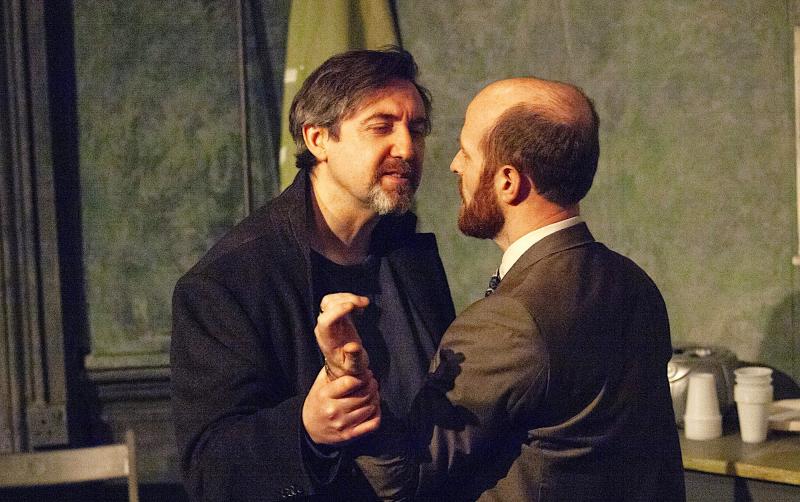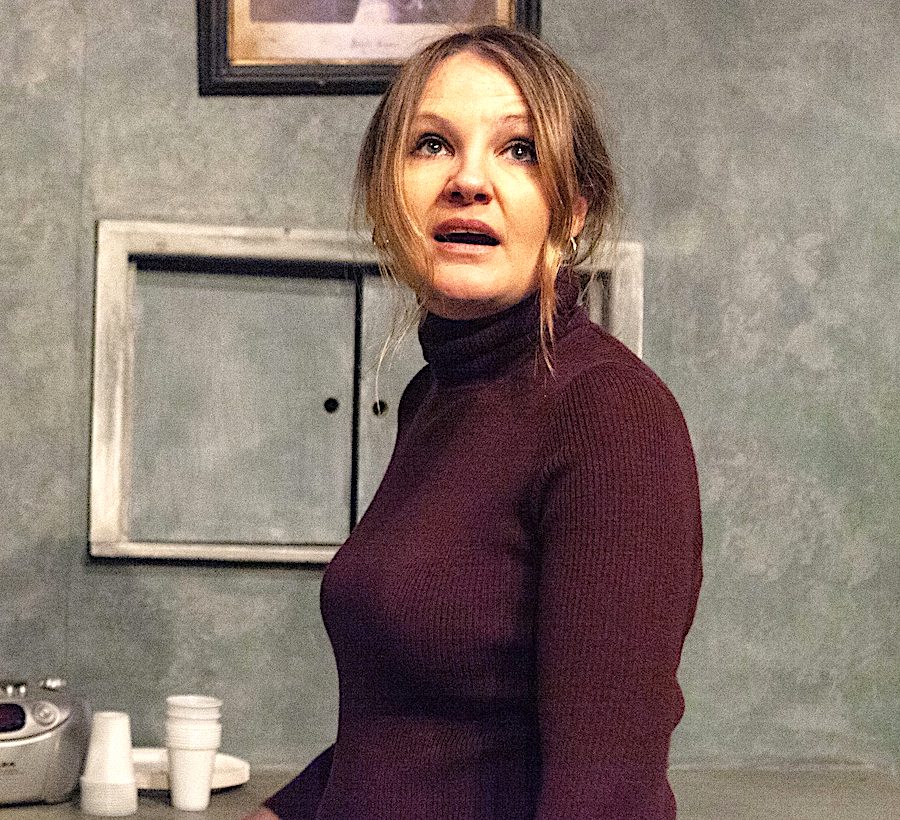On McQuillan's Hill, Finborough Theatre review - timely glance at Northern Irish myths and tensions | reviews, news & interviews
On McQuillan's Hill, Finborough Theatre review - timely glance at Northern Irish myths and tensions
On McQuillan's Hill, Finborough Theatre review - timely glance at Northern Irish myths and tensions
Joe Crilly believed in skewering the romance surrounding sectarian violence

The news that the Continuity IRA created a bomb destined for England on Brexit Day has added to the timeliness of this revival of Joseph Crilly’s gut-punching comedy.
One of the most striking aspects of Irish drama is the way in which landscapes and buildings are so strongly steeped in the memories of the lives and conflicts that have played out against them. Whether it’s the energies stirred up by the renaming of places in Brian Friel’s Translations or a pub in a Conor McPherson play, haunted by the stories told there over the years, that sense of the backdrop as witness is a frequent and potent part of the dramatic tension.
That’s very much the case here as we watch a series of encounters in a community hall on the eponymous McQuillan’s Hill. It’s a hall that has seen pretty much everything from secret sexual trysts to brawls: when the vast majority of the characters in the play walk into it, they are assailed by memories of their younger selves along with actions for which they must still carry the consequences.
Initially there’s a faint whiff of the formulaic as the characters introduce themselves, appearing two at a time to discuss what’s happening in the days over which the action unfolds. But then both the humour and the arrow-sharp directness of Crilly’s dialogue start to kick in. Gina Costigan (pictured below) and Declan Rodgers quickly strike sparks as Loretta, who has returned from a two-decade absence in London after buying the hall, and Ray, her predatory ex, a handyman who she has asked to help renovate it. So too do Johnny Vivash’s charismatic drunk, Fra Maline, and Kevin Murphy’s shiny-suited store department manager, Dessie, as they reignite the closeted gay love affair that has clearly been an emotional mainstay for both of them.
 Like Martin McDonagh, Crilly believed in skewering the romance surrounding sectarian violence, refusing to portray victims and martyrs, and instead revealing a world in which everyone is a mess of contradictions. One of the central tensions in the play is the search for who the mother of Julie Maguire’s simultaneously tough and vulnerable 21-year old Theresa is: as the answer slowly detonates, it calls into question a whole range of other assumptions, blasting any complacency or prejudice to pieces.
Like Martin McDonagh, Crilly believed in skewering the romance surrounding sectarian violence, refusing to portray victims and martyrs, and instead revealing a world in which everyone is a mess of contradictions. One of the central tensions in the play is the search for who the mother of Julie Maguire’s simultaneously tough and vulnerable 21-year old Theresa is: as the answer slowly detonates, it calls into question a whole range of other assumptions, blasting any complacency or prejudice to pieces.
This is the first time On McQuillan’s Hill has been performed outside Ireland. It is also the first time it has been performed since Crilly tragically committed suicide in 2017 because of clinical depression. Director Jonathan Harden, himself from Northern Ireland, sets a pace that at first feels a little too slow and steady. Yet the emotional truth of the performances that he encourages starts to burn through, and by the second half of the evening, we feel the full heat of each revelation.
Norman Coates’s lovingly scuzzy design compellingly adapts the Finborough so that it feels that we are all compressed into the same community hall, watching out nervously through the dirty windows to see who will next arrive. Every detail – from the type of beer cans scattered on the floor to the notices on the hall board – tells the story of a community in which the tragedies and comedies are played out against a backdrop of economic deprivation.
In a play distinguished, not least, by its strong female characters (including Helena Bereen’s entertaining busybody, Mrs Tymelly) it is Gina Costigan’s Loretta who particularly shines. As we lurch into a new chapter of altercations between England and Ireland, the loss of Crilly is to be mourned. It takes a particular talent to make you leave the theatre feeling simultaneously shell-shocked and amused. There’s little doubt his voice would have had no shortage of contributions to make over the next few months and years.
The future of Arts Journalism
You can stop theartsdesk.com closing!
We urgently need financing to survive. Our fundraising drive has thus far raised £49,000 but we need to reach £100,000 or we will be forced to close. Please contribute here: https://gofund.me/c3f6033d
And if you can forward this information to anyone who might assist, we’d be grateful.

Subscribe to theartsdesk.com
Thank you for continuing to read our work on theartsdesk.com. For unlimited access to every article in its entirety, including our archive of more than 15,000 pieces, we're asking for £5 per month or £40 per year. We feel it's a very good deal, and hope you do too.
To take a subscription now simply click here.
And if you're looking for that extra gift for a friend or family member, why not treat them to a theartsdesk.com gift subscription?
more Theatre
 The Maids, Donmar Warehouse review - vibrant cast lost in a spectacular-looking fever dream
Kip Williams revises Genet, with little gained in the update except eye-popping visuals
The Maids, Donmar Warehouse review - vibrant cast lost in a spectacular-looking fever dream
Kip Williams revises Genet, with little gained in the update except eye-popping visuals
 Ragdoll, Jermyn Street Theatre review - compelling and emotionally truthful
Katherine Moar returns with a Patty Hearst-inspired follow up to her debut hit 'Farm Hall'
Ragdoll, Jermyn Street Theatre review - compelling and emotionally truthful
Katherine Moar returns with a Patty Hearst-inspired follow up to her debut hit 'Farm Hall'
 Troilus and Cressida, Globe Theatre review - a 'problem play' with added problems
Raucous and carnivalesque, but also ugly and incomprehensible
Troilus and Cressida, Globe Theatre review - a 'problem play' with added problems
Raucous and carnivalesque, but also ugly and incomprehensible
 Clarkston, Trafalgar Theatre review - two lads on a road to nowhere
Netflix star, Joe Locke, is the selling point of a production that needs one
Clarkston, Trafalgar Theatre review - two lads on a road to nowhere
Netflix star, Joe Locke, is the selling point of a production that needs one
 Ghost Stories, Peacock Theatre review - spirited staging but short on scares
Impressive spectacle saves an ageing show in an unsuitable venue
Ghost Stories, Peacock Theatre review - spirited staging but short on scares
Impressive spectacle saves an ageing show in an unsuitable venue
 Hamlet, National Theatre review - turning tragedy to comedy is no joke
Hiran Abeyeskera’s childlike prince falls flat in a mixed production
Hamlet, National Theatre review - turning tragedy to comedy is no joke
Hiran Abeyeskera’s childlike prince falls flat in a mixed production
 Rohtko, Barbican review - postmodern meditation on fake and authentic art is less than the sum of its parts
Łukasz Twarkowski's production dazzles without illuminating
Rohtko, Barbican review - postmodern meditation on fake and authentic art is less than the sum of its parts
Łukasz Twarkowski's production dazzles without illuminating
 Lee, Park Theatre review - Lee Krasner looks back on her life as an artist
Informative and interesting, the play's format limits its potential
Lee, Park Theatre review - Lee Krasner looks back on her life as an artist
Informative and interesting, the play's format limits its potential
 Measure for Measure, RSC, Stratford review - 'problem play' has no problem with relevance
Shakespeare, in this adaptation, is at his most perceptive
Measure for Measure, RSC, Stratford review - 'problem play' has no problem with relevance
Shakespeare, in this adaptation, is at his most perceptive
 The Importance of Being Earnest, Noël Coward Theatre review - dazzling and delightful queer fest
West End transfer of National Theatre hit stars Stephen Fry and Olly Alexander
The Importance of Being Earnest, Noël Coward Theatre review - dazzling and delightful queer fest
West End transfer of National Theatre hit stars Stephen Fry and Olly Alexander
 Get Down Tonight, Charing Cross Theatre review - glitz and hits from the 70s
If you love the songs of KC and the Sunshine Band, Please Do Go!
Get Down Tonight, Charing Cross Theatre review - glitz and hits from the 70s
If you love the songs of KC and the Sunshine Band, Please Do Go!
 Punch, Apollo Theatre review - powerful play about the strength of redemption
James Graham's play transfixes the audience at every stage
Punch, Apollo Theatre review - powerful play about the strength of redemption
James Graham's play transfixes the audience at every stage

Add comment